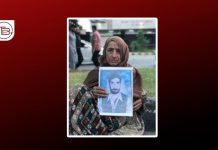Social media activist and journalist Bayazid Kharoti has been mysteriously disappeared from Quetta, the capital of Balochistan.
Bayazid Kharoti is the administrator of “Choti Chirya” a popular page on social media sites and he also writes for various newspapers. In reaction of his abduction, protestors have blocked the bypass road in Quetta at Khaizi chowk, and demand his immediate release.
Balochistan National Party chief and National Assembly member Sardar Akhtar Mengal reacted on this incident on Twitter saying “Bayazid Khan Kharoti founder of Choti Chirya has gone missing today. I urge all journalists to stand together against his illegal abduction. U might not agree with his views but its him today it might be U tomorrow. #WhereIsBayazid
Meanwhile, Balochistan government spokesperson Liaquat Shahwani said that Bayazid Kharoti is in police custody. He has been arrested for forcibly entering a an event held at the office of DG Levies today and interfering in government affairs, he added.
According to Liaquat Shahwani, a case has been registered against Mr Kharoti and he will be produced in the magistrate’s court.
At the time of writing this report, Bayazid Kharoti’s appearance could not be confirmed.
It should be noted that earlier in the past, Kharoti has faced violence by unknown individuals.
Balochistan, in the west of Pakistan, has been the scene of a long-running nationalist insurgency. Foreign journalists need to seek special permission to visit the majority of the province, while the Pakistani media is often wary of reporting on what is considered to be one of the most sensitive issues in the country.
According to the International Federation of Journalists, at least 29 media workers were killed in the province between 2007 and 2015.
According to a previous BBC report, the Pakistani military has been accused of torturing and “disappearing” dissidents. Insurgent groups have also killed members of non-Baloch ethnic groups.
A 2017 BBC report said, speaking on condition of anonymity, local reporters told BBC that earlier this year they had been warned by civil and military authorities in the province they would not “tolerate the version of militants in newspapers.” They were ordered not to publish anything attributed to the insurgents, BBC report read.






























